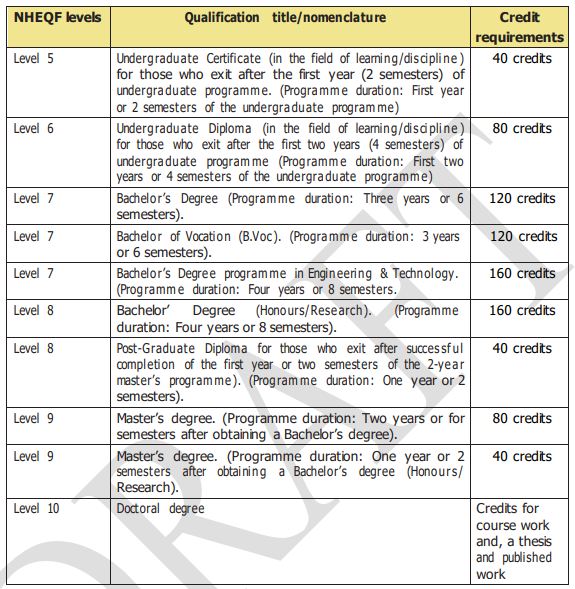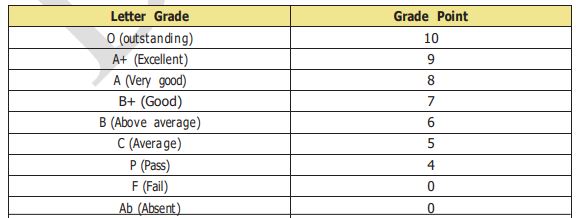UGC Draft on National Higher Education Qualification Framework (NHEQF) 2022 Based on NEP 2020: As per the official notice released, UGC has developed a draft National Higher Education Qualification Framework (NHEQF). The National Education Policy (NEP) 2020 stipulates that a National Higher Education Qualification Framework (NHEQF) will be formulated and it shall be in sync with the National Skills Qualifications Framework (NSQF) so as to ease the integration of vocational education into higher education, prescribe the facilitative norms for issues such as credit transfer, equivalence, etc.
President Ram Nath Kovind, also announced that "My government is implementing a new National Education Policy across the country to give shape to the resolve and potential of Atmanirbhar Bharat."
My government is implementing a new National Education Policy across the country to give shape to the resolve and potential of Atmanirbhar Bharat. pic.twitter.com/TWhbLKwttP
— President of India (@rashtrapatibhvn) January 31, 2022
Regarding NEP, Finance Minister Nirmala Sitharaman said, "In keeping with the National Education Policy and to remedy the damage by pandemic-induced closures of schools, Budget2022 aims at universalising quality education."
In keeping with the National Education Policy and to remedy the damage by pandemic-induced closures of schools, #Budget2022 aims at universalising quality education. #AtmaNirbharBharatKaBudget pic.twitter.com/0v7j75JJUu
— NSitharamanOffice (@nsitharamanoffc) February 1, 2022
Higher education qualifications leading to a degree/ diploma/ certificate shall also be described by the NHEQF in terms of such learning outcomes. University Grant Commission has put out the 72-page draft NHEQF in the public domain and has invited feedback/ Suggestions latest by 13th February 2022 on Email nepnheqf@gmail.corn.
UGC Draft on National Higher Education Qualification Framework (NHEQF)
India recognized the need for NQF both for general education and for vocational education and training (VET). The Ministry of Labour and Employment developed the National Vocational Qualifications Framework (NVQF) and the Ministry of Human Resource Development (renamed as Ministry of Education, after NEP 2020 recommendations) developed the National Vocational Education Qualifications Framework (NVEQF). These two frameworks were considered and used while developing the National Skills Qualifications Framework (NSQF) notified in 2013.
The NHEQF is an instrument for the development, classification, and recognition of qualifications along a continuum of levels from 5 to 10, with levels 1 to 4 of the National Skills Qualification s Framework (NSQF) covering school education. Each level is structured based on the defined learning outcomes, i.e., statements of what the learner is expected to know, understand and/or be able to do on the successful completion of an approved programme of study/ learning at a specified level. Students on completion of the chosen programme(s) of study under the NHEQF must possess and demonstrate the graduate profile/attributes defined in terms of the expected learning outcomes, whether they were acquired through one mode of learning or the other, or through a combination of different modes of learning such as direct in-person/face-to-face instruction, open and distance learning, online education, and hybrid/blended modes.
National Education Policy (NEP) & National Higher Education Qualification Framework (NHEQF)
On 29th July 2020, National Education Policy (NEP) was launched by PM Narendra Modi that aims at Transforming India by implementing key reforms in the Indian Education System. National Higher Education Qualification Framework (NHEQF) will assess students on a range of learning outcomes like from job readiness to constitutional values, theoretical knowledge to technical skills, higher education institutes across the country, etc.
The Draft states that “It has been felt that given the size of the higher education system and the diversity of institutions and programmes of study in India, the country needs to move towards developing a nationally accepted and internationally comparable and acceptable qualifications framework to facilitate transparency and comparability of higher education qualifications at all levels. The NHEQF is an attempt in this direction.”
National Higher Education Qualification Framework (NHEQF) Purpose
The purpose is to bring up/elevate all HEIs to a common level of benchmarking to ensure that all institutions are providing quality education. The framework is intended to allow for flexibility and innovation in
(i) programme design and syllabi development,
(ii) teaching-learning process,
(iii) assessment of students’ learning levels, and
(iv) periodic programme review within a broad framework of agreed expected programme/course learning outcomes and academic standards.
NHEQF Types and title/nomenclature of qualifications
The NHEQF is an outcome-based framework for qualifications of different types - Undergraduate Certificate, Undergraduate Diploma, Bachelor’s degree, Bachelor’s degree (Honours/Research), Post-Graduate Diploma, Master’s degree, Doctoral degree.
According to the draft, the NHEQF envisages the award of certificates, diplomas and degrees based on what students completing a particular programme of study are “expected to know, understand and be able to do at the end of their programme of study.” It is characterised by six levels based on the complexity of learning outcomes.
National Higher Education Qualification Framework (NHEQF) Levels
The NHEQF levels represent a series of sequential stages expressed in terms of a range of learning outcomes against which typical qualifications are positioned/ located. NHEQF level 5 represents learning outcomes appropriate to the first year (first two semesters) of the undergraduate programme of study, while Level 10 represents learning outcomes appropriate to the doctoral-level programme of study.
At every level, the students will be assessed based on parameters, including knowledge and understanding of theory; cognitive and technical skills; application of knowledge and skills; decision-making abilities; constitutional, humanistic, ethical and moral values; employment-ready skills and the entrepreneurship mindset.
NHEQF Qualification Type and Credit Requirements
NHEQF Draft also fixes the number of credits required to clear the different levels of the four-year undergraduate programme, master’s degrees and doctoral degrees.
Those looking to exit the undergraduate programme with a certificate will require 40 credits; with a diploma after two years will need 80 credits; degree after three years will have a requirement of 120 credits; degree with honours/research after four years with 160 credits. One credit is equivalent to one hour of teaching (lecture or tutorial) or two hours of practical work/field work per week, it adds.
NHEQF Letter Grades and Grade Points
For non-credit courses ‘Satisfactory’ or ‘Unsatisfactory’ will be indicated instead of the letter grade and this will not be counted for the computation of SGPA/CGPA. The universities or the autonomous colleges can decide on the grade or percentage of marks required to pass in a course and the CGPA required to qualify for a Certificate/Diploma/Degree taking into consideration the recommendations of the relevant standard-setting body.


Comments
All Comments (0)
Join the conversation